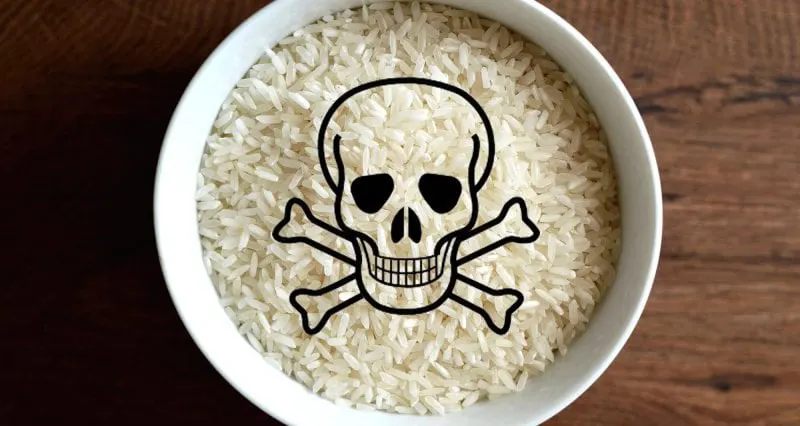Climate change fuels rising arsenic levels in rice. GM crop varieties, new growing techniques could cut toxic exposure
Climate change fuels rising arsenic levels in rice. GM crop varieties, new growing techniques could cut toxic exposure


Rice is particularly vulnerable to arsenic uptake because unlike most crops, it grows in flooded conditions with anoxic soil. Microbes that thrive in these anoxic environments release arsenic into the soil’s pore water through normal metabolic reactions. Once liberated from soil particles, this pore water arsenic can be taken up by the rice plant’s roots.
Previous studies have focused mainly on heat stress and its impact on how rice plants grow, possibly making them more likely to concentrate arsenic. What the new research indicates, however, is that “bioavailability may be more important,” [researcher Yasmine] Farhat said.
Farhat’s team grew rice plants in four greenhouses set to daytime temperatures of 25.4°C, 27.9°C, 30.5°C, and 32.9°C… Results showed a strong link between rice grain arsenic concentrations and temperature and confirmed that in hotter conditions, soil pore water contained more arsenic.
…
The fact that her team used soil low in arsenic is crucial, Farhat said: “Elevated growing temperatures may increase the risk of dietary arsenic exposure in rice systems that were previously considered low risk.”
“If you give the soils time to breathe, or become oxygenated, it is known to reduce arsenic quite a bit,” said Manoj Menon, a soil and environmental scientist at the University of Sheffield… Another potential solution, Menon said, is planting arsenic-resistant varieties of rice.
Read the original post

 | Videos | More... |

Video: Nuclear energy will destroy us? Global warming is an existential threat? Chemicals are massacring bees? Donate to the Green Industrial Complex!
 | Bees & Pollinators | More... |

GLP podcast: Science journalism is a mess. Here’s how to fix it

Mosquito massacre: Can we safely tackle malaria with a CRISPR gene drive?

Are we facing an ‘Insect Apocalypse’ caused by ‘intensive, industrial’ farming and agricultural chemicals? The media say yes; Science says ‘no’
 | Infographics | More... |

Infographic: Global regulatory and health research agencies on whether glyphosate causes cancer
 | GMO FAQs | More... |

Why is there controversy over GMO foods but not GMO drugs?

How are GMOs labeled around the world?

How does genetic engineering differ from conventional breeding?
 | GLP Profiles | More... |

Alex Jones: Right-wing conspiracy theorist stokes fear of GMOs, pesticides to sell ‘health supplements’




 Trust issues: What happens when therapists use ChatGPT?
Trust issues: What happens when therapists use ChatGPT? Fighting deforestation with CO2: Biotechnology breakthrough creates sustainable palm oil alternative for cosmetics
Fighting deforestation with CO2: Biotechnology breakthrough creates sustainable palm oil alternative for cosmetics California, Washington, Oregon forge immunization alliance to safeguard vaccine access against federal undermining
California, Washington, Oregon forge immunization alliance to safeguard vaccine access against federal undermining Viewpoint — Fact checking MAHA mythmakers: How wellness influencers and RFK, Jr. undermine American science and health
Viewpoint — Fact checking MAHA mythmakers: How wellness influencers and RFK, Jr. undermine American science and health 30-year-old tomato line shows genetic resistance to devastating virus
30-year-old tomato line shows genetic resistance to devastating virus Viewpoint: Video — Big Solar is gobbling up productive agricultural land and hurting farmers yet providing little energy or sustainabilty gains
Viewpoint: Video — Big Solar is gobbling up productive agricultural land and hurting farmers yet providing little energy or sustainabilty gains The free-range chicken dilemma: Better for birds, but with substantial costs
The free-range chicken dilemma: Better for birds, but with substantial costs ‘You have to treat the brain first’: Rethinking chronic pain with Sanjay Gupta
‘You have to treat the brain first’: Rethinking chronic pain with Sanjay Gupta
